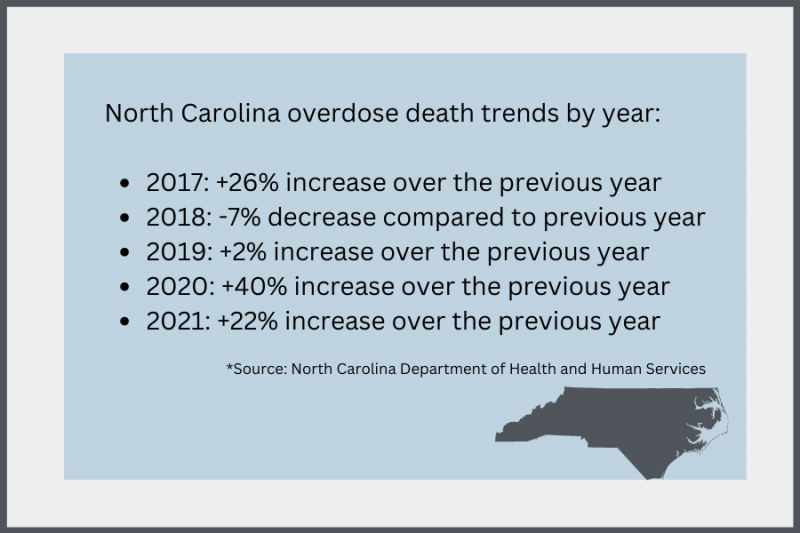By: Mary-Russell Roberson
June 1, 2023
A 2023 Preventing Child Trauma Summit Series Article
 Funds from the opioid settlement offer a golden opportunity to address the opioid crisis by preventing child trauma—a major risk factor for addiction—according to many speakers at “Leveraging North Carolina’s Assets to Prevent Child Trauma.”
Funds from the opioid settlement offer a golden opportunity to address the opioid crisis by preventing child trauma—a major risk factor for addiction—according to many speakers at “Leveraging North Carolina’s Assets to Prevent Child Trauma.”
“The settlement is projected to provide 18 years of funding,” said April Bragg, PhD, senior officer at the Dogwood Health Trust in Asheville. “That’s unlike any other funding stream we’ve seen.”
The funds come from a series of legal settlements with companies involved in distributing, manufacturing, or marketing the opioid painkillers that led to many people becoming addicted first to prescription pills and, for some, later to other illicit opioids. Payments to North Carolina from the settlement will total hundreds of millions of dollars and provide a relatively sustainable source of funding.
Effective treatments and prevention of addiction are desperately needed, with overdose deaths continuing to rise. In North Carolina, overdose deaths in 2020 were 40% higher than the year before, and the state saw another increase—22%—in overdose deaths in 2021, according to North Carolina Department of Health and Human Services data.
Many of those who stand to benefit most from prevention services are teens. Attorney General Josh Stein, who spoke at the summit via a prerecorded video, said that overdose has nearly doubled among teens between 2019 and 2020, and increased another 20% in 2021.
Opioid settlement funds could be used to scale up evidence-based addiction prevention programs for teens. “A number of well-tested programs to prevent the development of addiction in adolescents are available,” said Diana “Denni” Fishbein, PhD, director of translational neuro-prevention research at FPG. “They focus on improving or eradicating the underlying conditions that lead to substance abuse in the first place.”
Helping adults recover from addiction can also reduce child trauma, because many of those adults are parents or caregivers. Recovering from addiction decreases the chances that their children will suffer traumas such as neglect, exposure to violence, being removed from the home by child protective services, or losing a parent to a drug overdose. Some treatment programs also instill effective parenting skills, further bolstering positive outcomes for caregivers, teens, and children.
The benefits accrue in the other direction as well: decreasing child trauma reduces the risk of developing substance use problems later in life. “We know trauma can be upstream of behavioral health and substance use challenges,” Bragg said. “And substance use in the home is a major reason for children being removed from the home.”
The majority (85%) of the funds coming into North Carolina will be funneled to 117 local communities―100 counties and 17 municipalities, with the other 15% going to state government. Communities will have some choice about how to use the funds within a framework designed by a team including the Attorney General’s Office, the Department of Health and Human Resources, and the N.C. Association of County Commissioners.
To help with planning, Dogwood Health Trust is making grants of $300,000 per year for up to three years to communities in the region it serves, which includes 18 counties in western North Carolina and the Qualla Boundary. “Thoughtful and intentional and ongoing planning is more likely to maximize the impact of the settlement,” Bragg said.
Linda Richter, PhD, VP of prevention, research, and analysis at the Partnership to End Addiction, said, “All the powerful evidence that has been shared at this summit should be employed to enhance the traditional approach to substance abuse in this country. We have to make real and lasting change leveraging opioid settlement funds.”
According to Richter, preventing drug use encompasses much more than education about the risks. “What it actually is,” she said, “is getting in there early and changing the environment where the child lives. We need real structural changes to facilitate healthy and stable families and communities. Income, food, housing, healthcare, quality childcare, and paid family leave can help facilitate a healthy childhood, which is essential to reduce the chances of addiction in adulthood.” Focusing on this kind of environmental change is a public health strategy with the potential to help many families at once and achieve long-term, population level benefits.
Stephen Marshall, PhD, director of the UNC Injury Prevention Research Center, also pointed to the settlement as a way of supporting programs that can prevent both addiction and child trauma, and he encouraged attendees to lend their expertise to decisions about how to use the funds. While some states are divvying up large parts of the money “behind closed doors,” North Carolina’s framework is collaborative and community-based. “We need you,” he said. “This is democracy. You need to go to your local government and say, ‘What is your plan?’”
Bragg agreed. “Reach out to your county government,” she said. “You’re meant to be at the table. That’s the way the framework for this settlement has been designed.”
The UNC Frank Porter Graham Child Development Institute's (FPG) FRONTIER program sponsored a statewide summit, “Leveraging North Carolina’s Assets to Prevent Child Trauma,” April 27-28, 2023. Nearly 150 representatives from academia, community and state organizations, lived experience, philanthropy, government agencies, and governing bodies convened in person, and approximately 230 people joined virtually. The summit was organized by Diana “Denni” Fishbein, PhD, director of translational neuro-prevention research at FPG, and Melissa Clepper-Faith, MD, MPH, translational research program and policy coordinator at FPG. This article is one of a series dealing with issues discussed at the summit; find the full series here.